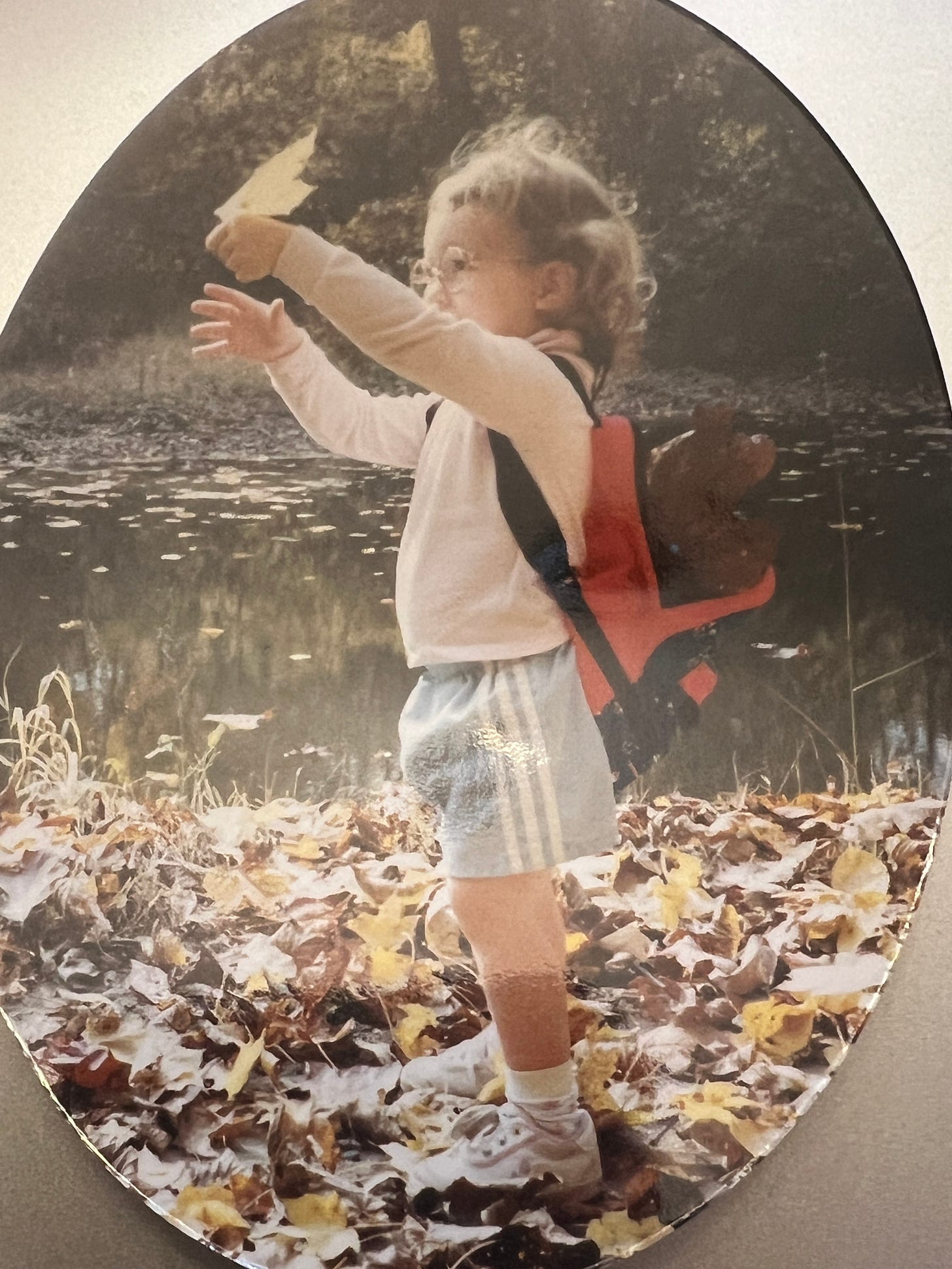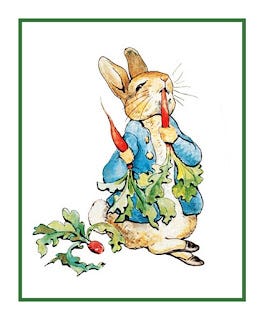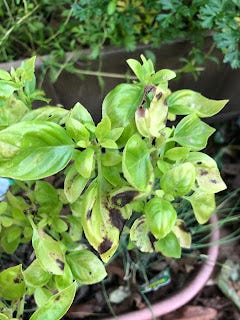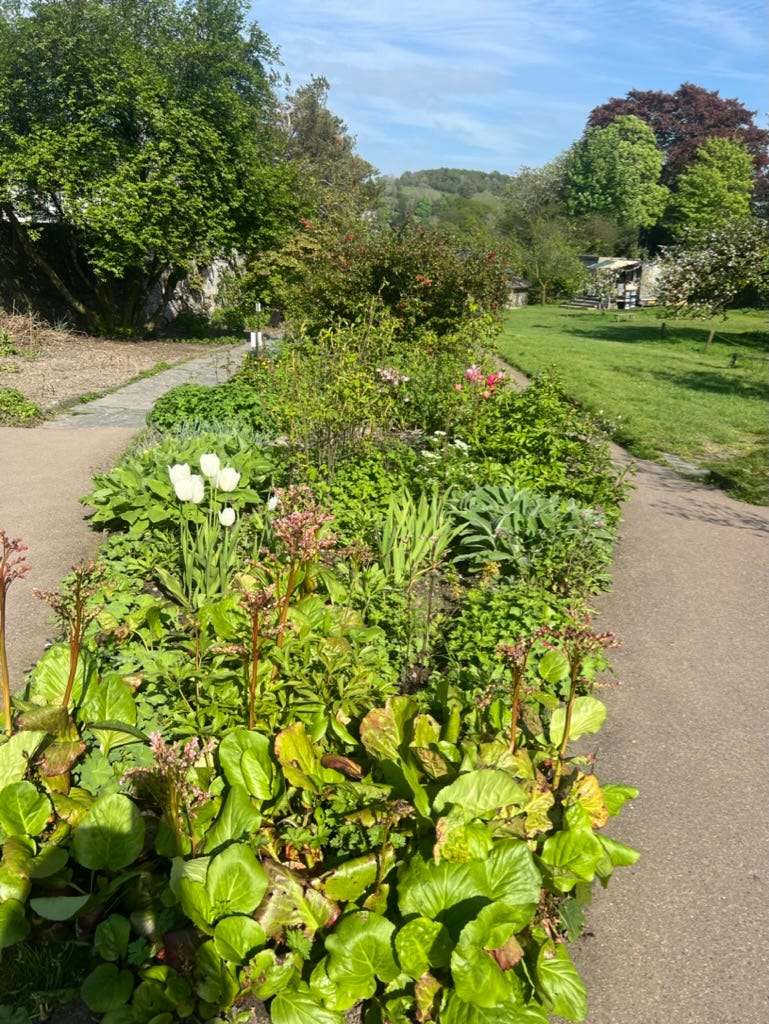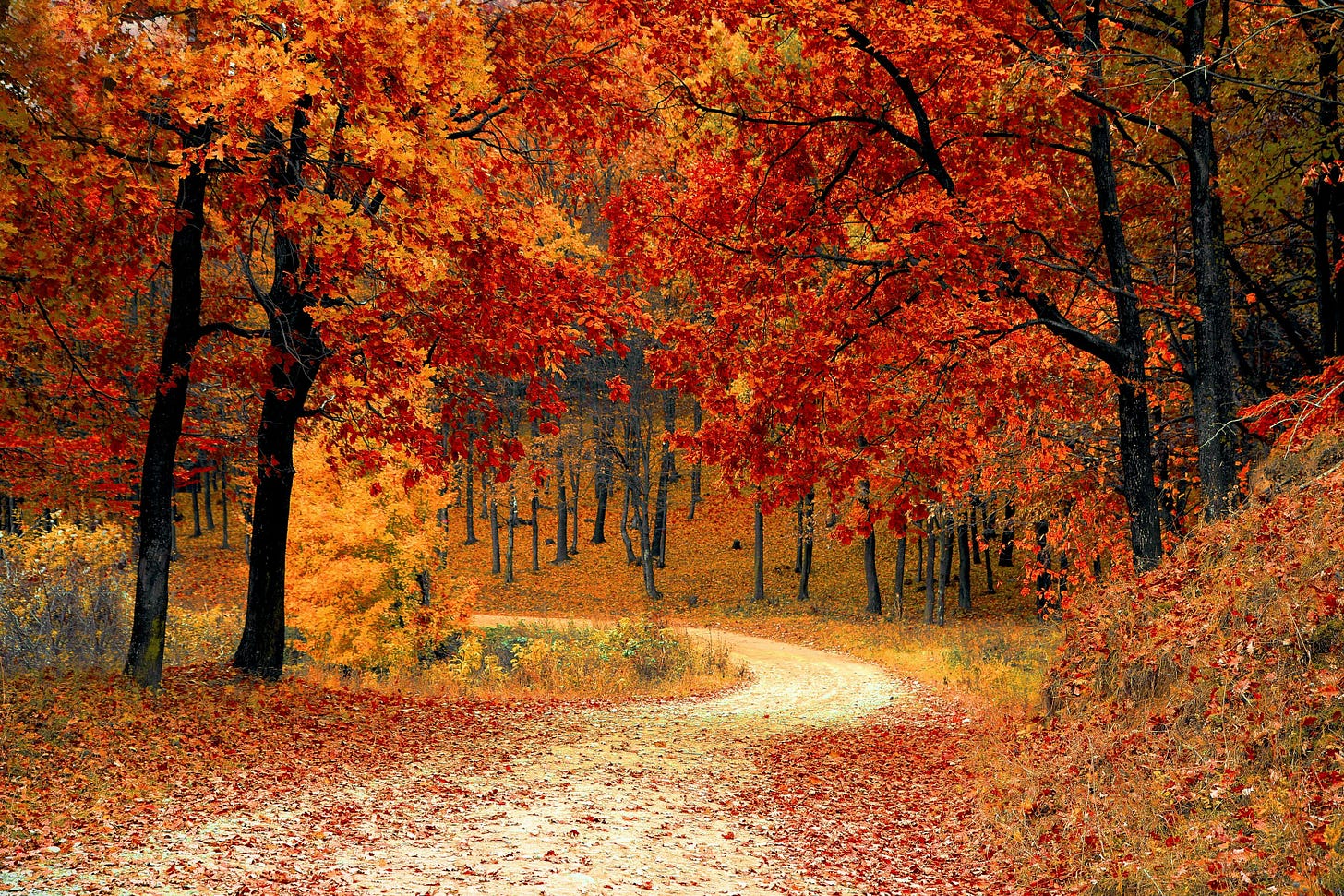"Falling," Quickly
and here we go again
Welcome to Autumn, 2025 edition. While I must say it’ll be kind of a relief to kiss this particular year goodbye, there is always joy and beauty to be found, in addition to the general chaos and upset. Let’s find some good stuff together, shall we?
Enjoy this tender and lovely tune from the equally tender and lovely film Once…
SONG: FALLING SLOWLY by Glen Hansard and Marketa Irglova
I wrote this a few years ago, when bunnies took over our garden. Maybe it would have been a charming situation had they (the bunnies) been wearing cute little waistcoats?
REFLECTION ON A RUINED VEGETABLE PATCH: Mr. McGregor’s Oreland Garden, or Roots, Shoots, and Oh, Shoot!
Aha! Caught orange-pawed!
There are clichés in literature, and in life, some of which are more accurate than others. But many are 100% spot on, including the plot of The Tale of Peter Rabbit. Remember Mr. McGregor, who was constantly outsmarted by Peter? Bugs Bunny pulled similar hijinks with Elmer Fudd in a far less cultured production, the Warner Bros. Cartoon.
This past Spring, Farmer Steve made a valiant attempt to plant a vegetable garden, which included carrots, zucchini, tomatoes, and eggplant. How the chef in me fantasized about plucking a perfectly ripe veggie from our bounteous harvest, to prepare for that night’s supper! Realizing that all good things take time, I didn’t worry when many weeks passed with little action, but finally we spied a few feathery green shoots that unmistakably belonged to carrot, poking up out of the dirt. Victory was ours!!
Around that same time, we began noticing evidence of a nest of baby bunnies (the main evidence was seeing the tiny bunnies themselves). How precious! Mom Rabbit was a good sized gal, always hopping nearby of course, watching over her furry darlings. The perfect addition to our bucolic scene! thought I.
But then the inevitable happened. Not content to just romp around looking fluffy, Mom R. decided to turn our wee little garden into an all-you-can-eat salad bar. The carrots were the first victims (of course, right?) but our other plantings didn’t fare much better. It wasn’t until the devastation was complete, that we began to hear other gardeners’ tricks of the trade "Oh, dear! You should have planted marigolds there too. Rabbits hate them and they would’ve kept the bunnies away from your carrots!" Appreciate the tips, folks, especially now that it's far too late to salvage anything!
We can’t lay the blame entirely on the winsome Cottontail family. We believe that there were also moles (voles? Is there a difference?) involved in devouring food items they did not pay for, and did nothing to nurture. We also began to suspect the wide variety of birds that were suddenly camped out in our back yard. Squirrels, too, and chipmunks. Green bean thieves and villainous squash eaters, the lot of them!
It was with some relief, when Fall arrived, that we gave up all pretense of vegetable growing. We focused instead on our pots of herbs, which did very well for a while, until they didn’t. The basil in particular began sporting round brown spots (never a good sign. I have freckles, so I know). The mint went wild, but then the tarragon did too. They became hopelessly entangled, and it was a vegetarian bloodbath with no survivors.
Steve has far more patience than I, plus a philosophical attitude and a willingness to learn (neither of which I possess). But even my hubby is admitting defeat, and yesterday planted hyacinth and daffodil bulbs for next spring instead. Those are inedible, so I have no interest in their success or failure.
“What’s up, Doc?” we ask, ruefully. Not our vegetables, apparently.
For the beloved author of Winnie the Pooh, autumn bliss=celery. Yup! I admit to pretty much ignoring celery’s crunchy deliciousness, until Yaj began to serve it sautéed, and our grandsons ADORE it!
ESSAY: A word for Autumn by A.A. Milne
Last night the waiter put the celery on with the cheese, and I knew that summer was indeed dead. Other signs of autumn there may be—the reddening leaf, the chill in the early-morning air, the misty evenings—but none of these comes home to me so truly. There may be cool mornings in July; in a year of drought the leaves may change before their time; it is only with the first celery that summer is over.
I knew all along that it would not last. Even in April I was saying that winter would soon be here. Yet somehow it had begun to seem possible lately that a miracle might happen, that summer might drift on and on through the months—a final upheaval to crown a wonderful year. The celery settled that. Last night with the celery autumn came into its own.
There is a crispness about celery that is of the essence of October. It is as fresh and clean as a rainy day after a spell of heat. It crackles pleasantly in the mouth. Moreover it is excellent, I am told, for the complexion. One is always hearing of things which are good for the complexion, but there is no doubt that celery stands high on the list. After the burns and freckles of summer one is in need of something. How good that celery should be there at one’s elbow.
A week ago—(“A little more cheese, waiter”)—a week ago I grieved for the dying summer. I wondered how I could possibly bear the waiting—the eight long months till May. In vain to comfort myself with the thought that I could get through more work in the winter undistracted by thoughts of cricket grounds and country houses. In vain, equally, to tell myself that I could stay in bed later in the mornings. Even the thought of after-breakfast pipes in front of the fire left me cold. But now, suddenly, I am reconciled to autumn. I see quite clearly that all good things must come to an end. The summer has been splendid, but it has lasted long enough. This morning I welcomed the chill in the air; this morning I viewed the falling leaves with cheerfulness; and this morning I said to myself, “Why, of course, I’ll have celery for lunch.” (“More bread, waiter.”)
“Season of mists and mellow fruitfulness,” said Keats, not actually picking out celery in so many words, but plainly including it in the general blessings of the autumn. Yet what an opportunity he missed by not concentrating on that precious root. Apples, grapes, nuts, and vegetable marrows he mentions specially—and how poor a selection! For apples and grapes are not typical of any month, so ubiquitous are they, vegetable marrows are vegetables pour rire and have no place in any serious consideration of the seasons, while as for nuts, have we not a national song which asserts distinctly, “Here we go gathering nuts in May”? Season of mists and mellow celery, then let it be. A pat of butter underneath the bough, a wedge of cheese, a loaf of bread and—Thou.
How delicate are the tender shoots unfolded layer by layer. Of what a whiteness is the last baby one of all, of what a sweetness his flavor. It is well that this should be the last rite of the meal—finis coronat opus—so that we may go straight on to the business of the pipe. Celery demands a pipe rather than a cigar, and it can be eaten better in an inn or a London tavern than in the home. Yes, and it should be eaten alone, for it is the only food which one really wants to hear oneself eat. Besides, in company one may have to consider the wants of others. Celery is not a thing to share with any man. Alone in your country inn you may call for the celery; but if you are wise you will see that no other traveler wanders into the room, Take warning from one who has learnt a lesson. One day I lunched alone at an inn, finishing with cheese and celery. Another traveler came in and lunched too. We did not speak—I was busy with my celery. From the other end of the table he reached across for the cheese. That was all right! it was the public cheese. But he also reached across for the celery—my private celery for which I owed. Foolishly—you know how one does—had left the sweetest and crispest shoots till the last, tantalizing myself pleasantly with the thought of them. Horror! to see them snatched from me by a stranger. He realized later what he had done and apologized, but of what good is an apology in such circumstances? Yet at least the tragedy was not without its value. Now one remembers to lock the door.
Yet, I can face the winter with calm. I suppose I had forgotten what it was really like. I had been thinking of the winter as a horrid wet, dreary time fit only for professional football. Now I can see other things—crisp and sparkling days, long pleasant evenings, cheery fires. Good work shall be done this winter. Life shall be lived well. The end of the summer is not the end of the world. Here’s to October—and, waiter, some more celery.
RECIPE: CELERY AND PECAN GRATIN (NYT COOKING)
Our dear friend, and gifted composer, James Grant (he was Sheridan’s composition teacher), is a major Diana Krall fan. Now I am, too! Here’s she’s singing a classic ode to my hometown in the Fall…
Along with turning leaves and pumpkin spice everything, football IS autumn (even for non-enthusiasts like me). Here’s the trailer for the inspiring film Remember the Titans. The true story of a high school football squad in the South learning to overcome racism and become a unified team of friends, is as timely as ever…
MOVIE TRAILER: REMEMBER THE TITANS
Evan introduced me to the work of Wendell Berry—New England farmer, poet and essayist—and he’s wonderful. Here’s a favorite poem, followed by a thoughtful response. Is it possible that the poems we discover, really are finding US, at just the right moments in our lives?
A Poem for Autumn: “Grace” by Wendell Berry
The woods is shining this morning.
Red, gold and green, the leaves
lie on the ground, or fall,
or hang full of light in the air still.
Perfect in its rise and in its fall, it takes
the place it has been coming to forever.
It has not hastened here, or lagged.
See how surely it has sought itself,
its roots passing lordly through the earth.
See how without confusion it is
all that it is, and how flawless
its grace is. Running or walking, the way
is the same. Be still. Be still.
“He moves your bones, and the way is clear.”
REFLECTION ON “GRACE” BY TOM SIMMONS (IN CHRISTIAN SCIENCE MONITOR)
This is tale of two poems -- or rather of one poem encountered in two very different ways.
The first encounter came in an English class several years ago, when a professor of mine was handing out poems by relatively unknown authors whose work we might want to investigate. One of the poems, by Wendell Berry, was called "Grace": The woods is shining this morning. Red, gold and green, the leaves lie on the grounds, or fall, or hang full of light in the air still. Perfect in its rise and in its fall, it takes the place it has been coming to forever. It has not hastened here, or lagged. See how surely it has sought itself, its roots passing lordly through the earth. See how without confusion it is all that it is, and how flawless its grace is. Running or walking, the way is the same. Be still. Be still. "He moves your bones, and the way is clear."
"A nice poem," I thought. I didn't have any special reaction to it; I read it over and filed it in may notebook.
The second encounter came about a year after the first, and 3,000 miles away. I'd reached a particularly aimless period of my life, and had tried to find some purpose by enrolling in a new school in a new location. It didn't work: the school and my studies only reinforced my feelings of aimlessness and lack of purpose.
On one pointless day I wandered into a bookstore I'd heard about that specialized in poetry. Passing along the shelves I came to Wendell Berry's Openings, which I immediately took down to examine.
"The woods is shining this morning," I read. How simple -- just the one detail, the quiet brilliance of the unexpected scene, began to fulfill my longing for something beautiful. Then came the color, the "red, gold and green"; and the feeling of falling at the end of the third line, changing utterly in the next line, jarring my dulled expectations.
I was hooked on this poem, my mind weaving a full tapestry from its thread of simple, carefully connected images. By the time I reached the later lines, I was feeling the poem as much as thinking it. It spoke to me of a peace so certain that I knew it existed for me as well as the author. In pondering the woods, the author was growing increasingly confident -- confident of beauty and integrity in life, confident of his own ability to embrace it. the opposite of arrogance or egotism, his quiet assurance suffused the closing lines of the poem: See how without confusion it is all that it is, and how flawless its grace is.
I needed the poem's confidence, and the poem obliged. It invited me to see through my own heart, and I saw: peace, and direction, and an unstated but perfectly real love. This experience with "Grace," in fact, was a kind of small revelation. On the strength of the insight I gained from it, I began to extricate myself from my own confusion.
My second encounter with "Grace" comes to mind when I think of the process of discovering a poem. Clearly not all poetry that we comes to know strikes us this way. I have spent many hours laboring through Milton; and, although i can't say that Paradise Lost has been much comfort, it has taught me a few things about drama, human feeling, and august discourse. Along with many other poems, it has been a source of knowledge, and therefore deserves some praise.
But discovered poems aren't just sources of knowledge. They are our own voices, brought out from our hearts into the open where we can hear them above the tumult of confused activity. They are the suppressed certainty within us of who we are, and what we are capable of; they remind us of things we have forgotten about ourselves.
It may seem odd that someone else -- a writer, who has never met us or even heard of us -- should make us remember who we, uniquely, are. But the writer, I think, is not primarily concerned with providing such reminders. Rather, he is conducting an initially private exploration of ideas and experiences that have touched him deeply. his tools for exploring are words, which at their best will guide him in a straight line from perception to idea, from feeling to thought to feeling. he is exploring authenticm experiences, as poet William Stafford defines the word in "An Introduction to Some Poems": The authentic is a line from one thing along to the next; it interests us.
This authenticity -- this ring of soundness, of wholeness -- draws forth our own voice, enabling it to speak confidently of our own soundness and wholeness through the poem.
The discovery of a poem that brings one's own voice to the fore can't be predicted. It depends on whether the reader is prepared to share the experience of the writer. If not, the poem will seem pretty, perhaps, but irrelevant -- as "Grace" did to me the first time I read it. The author and reader must be passing through a similar intensity of fire en route to a potential revelation, redirection, or peace. This "fire" need not be pain, although it may be; but it may also be simply desire -- a desire to learn, to understand, to be fulfilled for a time.
It seems to be a kind of rough rule that a reader with this desire will find the key, the poem through which his or her heart can sing. It is almost as if desire -- often unspoken, undefined -- draws us to the poem that leaves us singing. Divided between pain and longing, we come to a given poem with no particular expectations; and suddenly we hear our own definite voice through another's words, telling us what we already know, what we so desperately need to know: that grace, too, is for us; that our way, too, can be clear.
BLOG PREVIEW: RETURNING MY WISDOM PACKAGE
In which I pray for a (much) younger body, but ask to keep my elder wisdom. Reasonable request, right?
INSPIRATIONAL QUOTE OF THE WEEK:
I will carry Berry’s oh-so-wise advice with me through the week (and the life) ahead. Imagine a world where we ALL followed those instructions, my friends!


